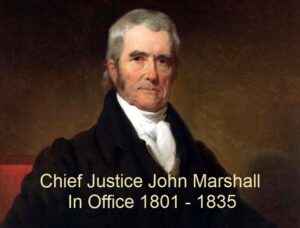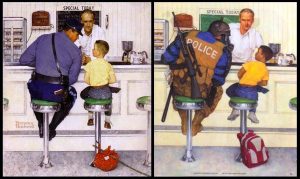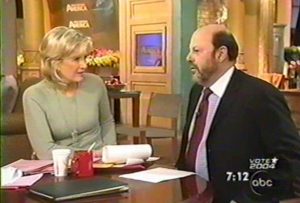The Ninth Amendment Shows that “Originalist” Constitutional Interpretation is a Fraud
“. . . ‘it is a general and indisputable rule, that where there is a legal right, there is also a legal remedy by suit or action at law whenever that right is invaded.’ . . . The government of the United States has been emphatically termed a government of laws, and not of men. It will certainly cease to deserve this high appellation, if the laws furnish no remedy for the violation of a vested legal right.” Chief Justice John Marshall, Marbury v. Madison,5 U.S. 137 (1803)
The Constitution is nothing other than what the Supreme Court says it is. It never has been, nor will it ever be, anything other than that. That is our system. That’s why the phrases in the Bill of Rights are written in vague language; for the courts to say what they believe is appropriate for those terms to mean, in light of our history, and to ensure that liberty and justice prevail.
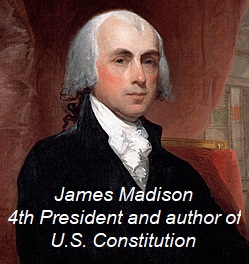 The Ninth Amendment to the United States Constitution provides:
The Ninth Amendment to the United States Constitution provides:
U.S. Const. Amend. IX:
“The enumeration in the Constitution, of certain rights, shall not be construed to deny or disparage others retained by the people.”
THE NINTH AMENDMENT IS SOLELY CONCERNED WITH CONSTITUTIONAL INTERPRETATION.
The Ninth Amendment is neither a grant of power nor a source of rights. It merely forbids a particular “construction” of the Constitution: [That] “The enumeration of certain rights [in the Constitution and in the Bill of Rights] may not be construed in a manner disparaging other retained rights”. Note that the “enumerated rights” referred to go beyond those “enumerated“, that is actually stated in the Bill of Rights or otherwhere in the Constitution.
In other words, the Ninth Amendment states that the Bill of Rights is not the exclusive list of rights that our Constitution protects, and that those rights that are enumerated in the Constitution and its amendments shall not be “construed to deny or disparage others retained by the people”. So, what are those “others retained by the people”?
WHAT RIGHTS ARE THOSE “OTHERS RETAINED BY THE PEOPLE?
The traditional view is:
The “residual rights” retained by the people were not a set of particularized rights that somehow escaped the listing of the Bill of Rights. Rather, they were rights that eighteenth-century Americans thought of as inalienable, natural, communal, and political. Residual rights included the right held most dear by all segments of American opinion from James Otis to George Washington and beyond: the right of self-government. In sum, the Ninth Amendment protected the very liberty for which the Revolution was fought. Otherwise it could plausibly be argued that the listing of a few traditional rights was all the people possessed, and that by ratifying the Constitution. Thomas B. McAffee, Rights Retained By The People; The Heritage Guide to the Constitution.
When the Ninth Amendment was ratified in 1791, rights enumerated in the Constitution included those listed in Article I, Sections 9 and 10, such as the right to the great Writ of Habeas Corpus, and the right against the impairment of contracts. Neither these nor any other rights enumerated in the Constitution are to be construed in the forbidden manner. Debates over the meaning of the Ninth Amendment generally focus on those other “rights retained by the people”.
THE COMPROMISE OF 1791:
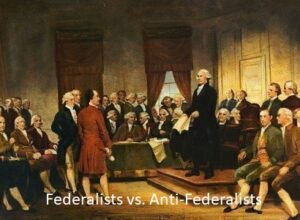 The Federalists (led by Alexander Hamilton, James Madison and John Jay) didn’t want a Bill of Rights because they were afraid that such an enumeration of rights would somehow hamper the federal courts in continuing the common law tradition of creating remedies for grave injustices; that is, to create a right against governmental conduct when justice demands it; regardless of the absence of an existing recognized remedy for such conduct.
The Federalists (led by Alexander Hamilton, James Madison and John Jay) didn’t want a Bill of Rights because they were afraid that such an enumeration of rights would somehow hamper the federal courts in continuing the common law tradition of creating remedies for grave injustices; that is, to create a right against governmental conduct when justice demands it; regardless of the absence of an existing recognized remedy for such conduct.
The Anti-Federalists (led Thomas Jefferson, Patrick Henry, Samuel Adams, and Richard Henry Lee) were leery of a strong federal government.
At the Constitutional Convention of 1787 they were opposed to the Constitution. They wanted a country more like the Articles of Confederation with a week federal government and with most of the power remaining in the states. However, since the Constitution was ratified by the states in 1789, the Anti-Federalists wanted at least a minimal guarantee of certain basic rights included in the Constitution. Ergo, the Ninth Amendment.
As James Madison argued at the Constitutional Convention of 1789 – 1791:
“It has been objected also against a bill of rights, that, by enumerating particular exceptions to the grant of power, it would disparage those rights which were not placed in that enumeration; and it might follow by implication, that those rights which were not singled out, were intended to be assigned into the hands of the General Government, and were consequently insecure. This is one of the most plausible arguments I have ever heard urged against the admission of a bill of rights into this system; but, I conceive, that it may be guarded against. I have attempted it, as gentlemen may see by turning to the last clause of the fourth resolution (the Ninth Amendment).” I Annals of Congress 439 (Gales and Seaton ed. 1834).
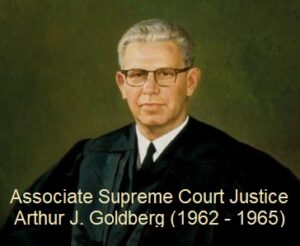
This view was repeated in 1965 when the Supreme Court held that the State of Connecticut could not criminalize contraception for married persons: “[T]he Ninth Amendment shows a belief of the Constitution’s authors that fundamental rights exist that are not expressly enumerated in the first eight amendments and an intent that the list of rights included there not be deemed exhaustive.” Griswold v. Connecticut, 381 U.S. 479, 492 (1965) (Goldberg, J., concurring)
TWO SCHOOLS OF THOUGHT ON MEANING OF NINTH AMENDMENT.
T
“Although the Ninth Amendment appears on its face to protect unenumerated individual rights of the same sort as those that were enumerated in the Bill of Rights, courts and scholars have long deprived it of any relevance to constitutional adjudication. With the growing interest in originalist methods of interpretation since the 1980s, however, this situation has changed.In the past twenty years, five originalist models of the Ninth Amendment have been propounded by scholars: the state law rights model, the residual rights model, the individual natural rights model, the collective rights model, and the federal-ism model.. . . the Ninth Amendment actually meant at the time of its enactment what it appears now to say: the unenumerated (natural) rights that people possessed prior to the formation of government, and which they retain afterwards, should be treated in the same manner as those (natural) rights that were enumerated in the Bill of Rights. In short, the Amendment is what it appears to be: a meaningful check on federal power and a significant guarantee of individual liberty.” Texas Law Review, Volume 85, Number 1, November 2006.
WHY “ORIGINALISM” IN CONSTITUTIONAL “INTERPRETATION” IS A FRAUD.
Okay Ladies and Gentlemen, so what exactly does that all mean? What Rights were “Reserved To the People” at the time of the ratification of the Bill of Rights by the states in 1791? Is that even the proper inquiry? Should we be asking, what rights do we now consider fundamental to ordered liberty? Should we consider the Ninth Amendment as the grand pronouncement of the rights that are so fundamental to a free people, that they actually really do go without saying, without some pronouncement from the Supremes to state the obvious. After all, what exactly does “due process of the law” mean anyway? Can the Supremes spit-out rights like the Delphic Oracle? Do we really want Judges to define what “societal norms” are? Do we really want Judges to define what constitutes ordered liberty? Isn’t that what’s been going on all along? Or is something else really going on here. Maybe, in the tradition of the common law(“Judge made law“), “we hold these rights to be self-evident.”
There’s no Supreme Court cases on issues like these, because some “norms” and values are so central to our moral and legal fabric, behaviors and traditions, and to our understanding of the role and importance of the individual, that no one (in their right mind) would bother to make such an argument against such fundamental liberties; the rights of a free people.
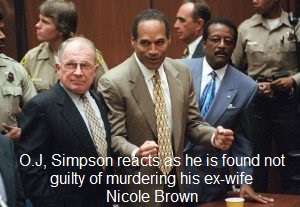 O.J. Simpson, who most people believe is clearly guilty of murdering two people in Los Angeles in 1994, was able to “beat the rap“, because he could afford high priced legal talent.
O.J. Simpson, who most people believe is clearly guilty of murdering two people in Los Angeles in 1994, was able to “beat the rap“, because he could afford high priced legal talent.
Rich people have a lot better chance of beating the rap than most of the Ladies and Gentlemen awaiting trial in the County Jail.
This author recalls the announcement of the verdict in the O.J. Simpson case, as one of those moments in one’s life, that everyone remembers where they were, what they were doing, and who they were with, when that verdict acquitting O.J. Simpson of murder, was announced. Most persons of European dissent believed that Mr. Simpson was guilty. The black community seemed to have cheered the not guilty verdict. This didn’t help race relations in Los Angeles.
Nonetheless, our American society did not disintegrate when O.J. was acquitted of murder. Many persons of African descent, were thrilled with the outcome; primarily because a black man won; finally. However, we are here, and life goes on.
We realize, as a people, that it is better to have a system where a guilty man goes free, than one where we don’t take reasonable efforts to minimize innocents from being convicted and imprisoned. We understand as a “collective political consciousness”, that no matter what you did, you are entitled to “due process of the law” and a “fair trial” by a jury; even for the most ostensibly despicable individuals. Jack Ruby murdered Lee Harvey Oswald on live national television in the Dallas Police Station. Nonetheless, no American would ever think that Jack Ruby shouldn’t have gotten a fair trial before an impartial jury of his peers. We just don’t think that way. That’s what being American is really all about; freedom from the government oppressing you, rather than protecting you. That’s it. Liberty.
ARE THOSE “OTHERS RETAINED BY THE PEOPLE RIGHTS THAT WOULD NOT HAVE BEEN SEEN AS RIGHTS IN 1791?
The basic American view, of the relationship of the individual to the government, is the guiding light to find those fundamental tenants of liberty; to those “others [rights] retained by the people”, described in the Ninth Amendment. The Ninth Amendment is a powerful Constitutional amendment that Americans often overlook. While the Tenth Amendment addresses states’ rights, the Ninth Amendment focuses on individual liberties not specifically enumerated in the Bill of Rights. The Founding Fathers’ intent in amending the Constitution, was to make it clear to future generations of Americans, that each level of government must remain in check and individual liberties must always be secured and protected. It permits the court to step-in and prevent the government from denying persons rights that are so apparent and inherent in a free society, that the government cannot trample them.
“As Sanford Levinson has observed, the Ninth Amendment enables critics of Originalism to contend that Orginalists, such as former Attorney General Meese and Judge Bork, ignore the implications of the Ninth Amendment and thus depart from their own stated commitment to constitutional text and original intent. If the ninth amendment was intended to point toward enforceable fundamental rights that exist apart from the text, then Orginalists who deny that these rights exist are compelled to resort to a non-Originalist grounding for their constitutional theory. In doing so, Originalist are forced to abandon one of the enduring sources of appeal for their position, the idea that the founders intended a Constitution of relatively fixed dimensions.
As evidenced by the Bork hearings and the latest outpourings in the law reviews, the Ninth Amendment has become anything but a joke; indeed, the view that the ninth amendment provides a sound basis for the discovery and judicial enforcement of unenumerated individual rights is gaining some new adherents in the judiciary and fast becoming the new orthodoxy in the academy and in Congress.” “The Original Meaning of the Ninth Amendment” 1-1-1990; Thomas B. McAffee; University of Nevada, Las Vegas — William S. Boyd School of Law.
In other words Ladies and Gentlemen, there are two camps; two schools of thought on the Ninth Amendment issue. Do we create rights out of thin air, such as the right to use contraception (Griswold v. Connecticut, 381 U.S. 479 (1965) ), and the right to an abortion (Roe v. Wade, 410 U.S. 113 (1973)), or are such “rights” of that category of “inalienable rights” that are so fundamental to a free society, that they go without saying; that the rights already exist under a broader category of those fundamental to ordered liberty and a free society, and the application of that categorical doctrine merely classify those certain particular rights as those belonging to that category.
When we are faced with new forms of threats to our liberty we appeal to the courts to bring justice to the world. To define ordered liberty for us. To literally, tell all of us what we can and can’t do.
THERE IS NO CONSTITUTION, THERE IS NO LAW.
Ladies and Gentlemen. In the truest sense of the word, there is no law. The is no Constitution. There is nothing. There is only the body politic, and their willingness to abide by the edicts handed-down from the Supreme Court. As the late Mr. Justice Scalia admitted in news interview: The law is whatever the Supreme Court say it is. After all, the terms “due process of law” and “unreasonable search and seizures” are not terms that can be applied with rigorous or mathematical precision.
You can watch FOX News all that you want to, but that will never change the fact that all federal constitutional law is made up by the Supreme Court, either way the case comes out. Any lawyers, judge or law professor will tell you this. The real question is whether the Justices are going to make good law or bad law. It’s really that simple.
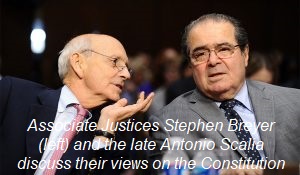 The “Originalists“, like the late Mr. Justice Scalia, view the Constitution as source of law that should be interpreted according to the intent of those who composed and adopted it in 1791. This view, however, is only applied to situations that don’t contradict or impede the Conservative wing’s (of the Supreme Court) agenda (“Heads I win, tails you lose.”) In those situations, the Originalist philosophy seems to somehow give way to pragmatism, when great inequities or grave injustices would arise, or when the Conservative agenda would be defeated.
The “Originalists“, like the late Mr. Justice Scalia, view the Constitution as source of law that should be interpreted according to the intent of those who composed and adopted it in 1791. This view, however, is only applied to situations that don’t contradict or impede the Conservative wing’s (of the Supreme Court) agenda (“Heads I win, tails you lose.”) In those situations, the Originalist philosophy seems to somehow give way to pragmatism, when great inequities or grave injustices would arise, or when the Conservative agenda would be defeated.
So, for example, hanging horse thieves wouldn’t have been considered the type of “cruel and unusual punishment” proscribed by the Eighth Amendment, when it was ratified by the states in 1791. However, the late Justice Scalia would not have permitted the hanging of horse thieves. He’s would not have allowed that. Period. Originalist, transcendentalist, intellectual, Catholic, scholarly, what ever you want to call him; he would have “found a way” not to give his Originalist beliefs “away”, and, contemporaneously, would have somehow figured out a rationale to have achieved the same result (that the federal constitution would have prohibited hanging horse thieves.) And, frankly, even if the late Mr. Justice Scalia, would have to “give away the store” (i.e. admit his Originalist philosophy isn’t all that Originalist, and is flexible), he still wouldn’t hang a horse thief. We and he are just not like that.
The other side, those whose support and believe in a “living constitution“. A living Constitution is one that evolves, changes over time, and adapts to new circumstances, without being formally amended. This can bring great justice to our everyday lives. But, asalways, there is another side of the story. When will we change, or simply ignore, those minimal protections that the Constitution provides for us? When the World Trade Center Blows-Up? When the inconvenience to the police (i.e. extra manpower, time and paperwork to get a search warrant or arrest warrant) outweighs your right to have a neutral and detached magistrate decide if the officers may enter your home and rip it apart?
Ignoring original intent is not always a one edge sword, but it usually is. As Mr. Justice Scalia told the Senate Judiciary Committee on October 5, 2011, the Justices cannot even agree on what their role is; social engineer, “judicial policymaker / legislator“, “referee” or “goalie”.
THE NINTH AMENDMENT’S GUIDING LIGHT.
Ted Turner once said, that he could prove abortion wasn’t murder, because they don’t hold funerals for aborted fetuses. If the doctors in the abortion clinics started actually killing babies, we’d all be over there with shotguns and would take them out. We wouldn’t wait for the police. But we’re not over there, because that’s just that way that we all feel about it. It’s kind of the same thing. It’s just the way we feel about it. That’s what ordered liberty really is. It’s just the way that you feel about it.
These Ladies and Gentlemen on the Supreme Court need to start using the Ninth Amendment, to straighten things out. Bad things. Wrong things. Unjust things. Why, has there never been a United States Supreme Court case that actually held, that a person can sue for a Constitutional violation, when the police try to frame them for a crime? Never. Shameful.
Although up until 2017 there was no U.S. Supreme Court case on whether a malicious criminal prosecution by a police officer is a constitutional violation, and, if so, under what constitutional provision would the Supreme Court attribute it to.
Prior to 2017 there are a few Ninth Circuit cases that piddled around with the very notion of whether a malicious criminal prosecution is a “naked Constitutional tort” (i.e. See, Galbraith v. County 0f Santa Clara, 307 F.3d 1119 (2002); one of the two actual only Ninth Circuit Court Appeals case that flat-out proclaim that a malicious criminal prosecution constitutes a violation of your Fourth Amendment rights.
Under Galbraith and Awabdy v. City of Adelanto, 368 F.3d 1062 (9th Cir. 2004), when the officer beats you up, authors a false police report that claims that you took swing at him (so he had to put you in the hospital), and that results in your bogus criminal prosecution that was ultimately resolved in your favor in a “manner inconsistent with guilt”, the innocent civilian can sue for a violation of their Fourth Amendment rights, so long as the presumption of prosecutorial independent judgment (i.e. Smiddy v. Varney) is overcome, but most of them dance with the issue, and even question the actually legal footing of a Section 1983 “malicious prosecution action.” However, post-Galbraith cases often reverted back to pre-1994 jurisprudence, and assert that a malicious criminal prosecution is actionable, if it is brought to enforce some other constitutional right. See, Awabdy v. City of Adelanto.
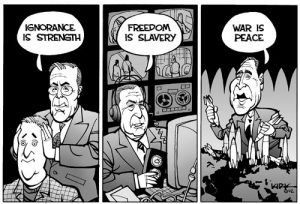 That was really “Orwellian newspeak“, since adverse actions, like a Constable beating or falsely arresting a civilian, that, of course, often results in a bogus and malicious criminal prosecution, for another Constitutional right, are a violation of that other right. So, if the Constable beats-you-up, and falsely arrests you, and procures your malicious criminal prosecution, because you didn’t care for his demeaning treatment of you and you complained to his supervisor, then there is a First Amendment violation. You don’t need a separate naked Constitutional tort of malicious prosecution for that situation, because the malicious prosecution is merely one of the acts of retaliation for your exercise of free speech; a First Amendment violation (i.e. the First Amendment’s right to petition the government for redress of grievances, like protesting police actions to the police.)
That was really “Orwellian newspeak“, since adverse actions, like a Constable beating or falsely arresting a civilian, that, of course, often results in a bogus and malicious criminal prosecution, for another Constitutional right, are a violation of that other right. So, if the Constable beats-you-up, and falsely arrests you, and procures your malicious criminal prosecution, because you didn’t care for his demeaning treatment of you and you complained to his supervisor, then there is a First Amendment violation. You don’t need a separate naked Constitutional tort of malicious prosecution for that situation, because the malicious prosecution is merely one of the acts of retaliation for your exercise of free speech; a First Amendment violation (i.e. the First Amendment’s right to petition the government for redress of grievances, like protesting police actions to the police.)
So, when the Constable falsely and malicious authors a crime report that shows that you took an ”aggressive stance”, with your fists clenched, and yelled “f__k you at the officer (none of which were true) and, therefore, he had to put you in the hospital because he has the right to go home at night, no one knows to this day can definitively tell you whether you can sue the officer for procuring your attempted frame-up, if you thereafter get criminally prosecuted for such bogus claims, and somehow win. Is this outrageous government conduct? Do you need to be a law professor to know that such conduct is just plain evil? Isn’t it inherent in ordered liberty that such an attempted frame-up of you, provide you a civil remedy is by some miracle you can prove that the Constable is lying, and beat the rap?
Moreover, in many cases, the cops and/or the persecutors don’t understand the contours of Contempt of Cop cases, and file criminal actions when they have no arguable legal basis to do so (i.e. prosecuting a civilian for resisting / obstructing / delaying a peace officer [Cal. Penal Code § 148(a)(1)] for actions like refusing to consent to warrantless police entry into private residence (i.e. failing to open one’s door on demand.) The persecutors are immune for persecuting bogus malicious criminal actions, and so are the judges (“Those who have the most gold, make the rules.”) So, if some upstart aggressive persecutor, might want to make a few political ties with the Constabulary by prosecuting the victim of police outrages, he “persecutes” a Section 148(a)(1) action; 90 + percent of which are complete B.S.
THE SUPREME COURT “PUNTS” AGAIN ON USING THE 9TH AMENDMENT TO DECLARE MALICIOUS CRIMINAL PROSECUTIONS AS CONSTITUTIONAL VIOLATIONS.
Fortunately, in Manuel v. City of Joliet, 580 U.S. ___ (2017), the Supreme Court held that a person who was being held in jail prior to his case being dismissed could sue for damages for his continued incarceration until the case was dismissed and he was released. The arrested officer arrested Manuel for narcotic possession but he was innocent, and the case was ultimately dismissed.
Manuel sued the police for falsely arresting him and for fabricating a bogus police report that resulted in his false criminal prosecution. While dodging the ultimate question presented (can one sue the police for a malicious criminal prosecution), the Supreme Court did hold that Manuel can sue the police for his confinement, including that time spent in jail after the prosecutor had filed criminal charges that resulted in his continued incarceration.
THE EXCLUSIONARY RULE HAS PERVERTED YOUR CONSTITUTIONAL RIGHTS.
That all being said, for the last thirty-five years, the Supreme Court has given back, those “enumerated” rights. They have done so, because of the exclusionary rule. It’s real easy. Instead of moaning about having to exclude evidence obtained by the government unlawfully (i.e. U.S. Const. Amends 1, 4, 5,6 & 8) , feloniously (i.e. 18 U.S.C. § 241 & 242) and tortiously (i.e. 42 U.S.C. § 1983), just declare the previously deemed unconstitutional conduct to be Constitutional. What Fourth Amendment? Logic, stare decisis, and any plain respect for others be damned. What Constitutional violation? I didn’t see one. Did you?
Unfortunately, because the “exclusionary rule more than often than not, dictates the contours of how poorly the government can treat you, the Ninth Amendment might serve as a safe house, for basic liberties that are most often at issue in criminal prosecutions. In other words, the Ninth Amendment might define Constitutional protections, not exactly enumerated, but basic enough to receive universal recognition. The greatest threat to all Constitutional violations, is not enforcing them because the interest of the government (whoever that really is) outweighs the individual’s actually enumerated Constitutional rights. Where, exactly, is this “balancing test” discussed in the Constitution? Who are these all knowing “Delphic Oracles“, who acknowledge our Constitutional rights, and have the Chutzpahto tell us that their pals’ interest (usually in being oppressive jerks) outweighs ours.
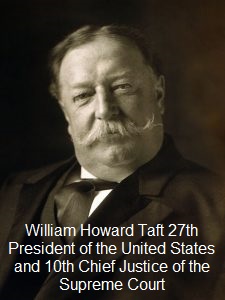 William Howard Taft served one term as President of the United States (1909-1913.) President Warren G. Harding nominated Taft, Chief Justice of the United States, on June 30, 1921. The Senate confirmed the appointment the same day, making Taft the only person in history to have been both President and Chief Justice. MR. JUSTICE TAFT, once was quoted as saying, that after he had served on the Supreme Court for a while, he kind of forgot that he was the President of the United States. It was now relatively inconsequential to him. He now decided what the Constitution says; whatever the Supreme Court says that it says. He says what the law is, or even whether the Ninth Amendment gives him that rights. That is the quandary of the Ninth Amendment. Whether to have the Courts “create rights” that just are not “on the books” at this moment in time.
William Howard Taft served one term as President of the United States (1909-1913.) President Warren G. Harding nominated Taft, Chief Justice of the United States, on June 30, 1921. The Senate confirmed the appointment the same day, making Taft the only person in history to have been both President and Chief Justice. MR. JUSTICE TAFT, once was quoted as saying, that after he had served on the Supreme Court for a while, he kind of forgot that he was the President of the United States. It was now relatively inconsequential to him. He now decided what the Constitution says; whatever the Supreme Court says that it says. He says what the law is, or even whether the Ninth Amendment gives him that rights. That is the quandary of the Ninth Amendment. Whether to have the Courts “create rights” that just are not “on the books” at this moment in time.
THE NINTH AMENDMENT IS A VEHICLE FOR TRUTH, JUSTICE AND THE AMERICAN WAY.
The Ninth Amendment to the Constitution is a vehicle for truth, justice and the American way. That is, if you want to take that step. Let justice be done. Although the Court’s need not be the modern day Delphic Oracle, they nonetheless should bring fundamental justice to a situation, when the government denies persons what society is prepared to accept as basic fundamental rights of a free society with ordered liberty. The Court should, more often, reach a reasonable accommodation between becoming a “super legislature”, and making sure that the government doesn’t do its own citizens dirty. It isn’t that big a stretch for the Ladies and Gentlemen on the Supreme Court, for them to simply find that it offends our sense of ordered liberty for the government to maliciously prosecute you, and be immune therefrom. It’s just wrong. It’s what oppression is. That.
What the Ninth Amendment really should be viewed as not creating new rights, but simply acknowledging that there are certain basic fundamental rights, like the right to be free from oppressive government behavior, and what the Originalists call newly created rights, are nothing more than categorizing new and “creative” forms of oppressive government behavior, as violation of that right to be free from outrageous and oppressive government conduct. Justice Scalia’s concern that the Supreme Court shouldn’t become a super-legislature is a legitimate one. But ever since the Supreme Court has declared itself the supreme branch of government with the final say (i.e. Marbury v. Madison), there’s no turning back. In cases where there is no right to be free from oppressive government conduct, the Court must step in, and stop it. The Ninth Amendment is their vehicle for doing so. It’s time to step-up and right outrageous wrongs.
Law Offices of Jerry L. Steering
Jerry L. Steering, Esq.
Published: 2/5/2019
***The State Bar of California does not certify a specialty in police misconduct
which is most of Mr. Steering’s law practice.
*In the District of Columbia only.
**In Beverly Hills Office only.
I Annals of Congress 439 (Gales and Seaton ed. 1834).

